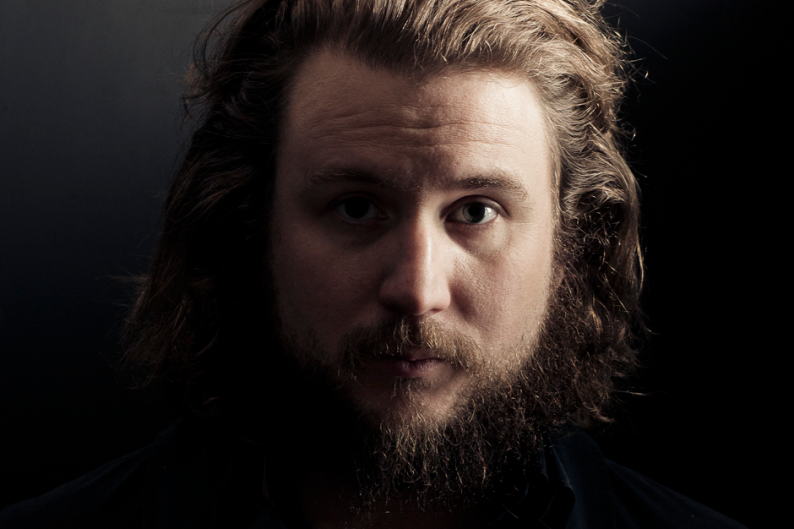Ian MacKaye: Well we’ve known each other for 25 years or more, and we’ve certainly had our share of arguing.
Jeff Nelson: I think as much musical tastes as we share–we both pretty much love the Beatles above all else, and a lot of early stuff we both still love–our musical tastes have diverged quite a bit over the years.
MacKaye: I still like the Vibrators and the Saints. Jeff grew up on us.

Also Read
Compact Discs: Sound of the Future
Nelson: So, for years and years I would be wishing, let’s break out and do some different stuff, who cares what the kids are expecting from Dischord, we’re the ones setting the agenda. It’s always just been based on what we’ve thought was good.
MacKaye: Of course I think we have broken out and have put out different things. And this is exactly the type of conversation which I think is inappropriate in terms of an article about the label. Because really this is about? when people work together in partnerships or any type of thing, there’s all sorts of deeper currents and things like individuality, aspects of our individuality. Jeff and I could sit here for the next 12 hours and discuss when he said something like, “Well, I wish we had brought things in really different, a real divergent path,” and I’m like, “We did that.” Ultimately the proof is in the pudding. That’s what the box set is there for. I don’t think either one of has loved all the disagreement or the whatever. And not just between Jeff and I; it’s a larger group of people. It goes back 20, 22 years now. But I can’t imagine things would have turned out the way they did had we not gone through all the stuff we have gone through. So, it is what it is. So I don’t really know. I think that to try to get to the root of it would sort of be a waste of time ultimately.
Nelson: Maybe one doesn’t have to get all the way to it. I don’t think it’s inappropriate or uninteresting–I think it’s quite germane. In other words, just me saying one sentence, “Over the years we’ve certainly misread this and that and I’ve always wanted to break out even more then what we’ve known for,” and you saying “We already did!”I think at this point we’ve already been through that argument so many times, and I would agree [with] you to a certain extent that we already have. We’re certainly not putting out the same stuff we put out in ’81, ’82, ’83. But, to me–
MacKaye: I mean, there are those who argue that we’ve been at the vanguard of music–
Nelson: Yeah, sure. in terms of certain types of music–
MacKaye: I mean, in general, in terms of musical voice, what types of music are you referring to?
Nelson: The bands that are just not considered cool. It would be incredibly odd, now, I agree, to put alt-country stuff out on Dischord. But understand that’s an example of music that’s coming out of the D.C. scene here that’s made by good people, that’s really great, that we’re not covering. We’ve had this argument so many times. SST put out a lot of great records, but it seemed to me they just started putting out just about anything all across the board, and I think they lost serious fans of the label. In other words, I think Dischord has in many ways kept lots of fans of the label who like the kind of stuff in general that we seem to put out.
MacKaye: It’s because there’s a cohesion in the sense of a basic idea that it will be something that will have at least some thread, some reason. I personally think there’s music on our label that defies categorization, though most people say, “Oh it’s hardcore,” which is completely absurd. That’s just shows the limitations of people’s? it was really a result of in terms of the music media. I actually don’t think Dischord is categorized, except for the fact that I say punk rock. But that’s just a term that we used when we got into the counter-cultural underground, the counter-cultural world. The area that was challenging conventional thinking. We were rebelling [in] 1978, 1979, when we were in WilsonHigh School together. Gosh, what the fuck were we listening to? I was into Ted Nugent, I was a Nugent guy. I was a skateboarder listening to Ted Nugent. We both liked listening to hard rock. He was listening to it before I was. The Raz, stuff like that, D.C. bands.
And then people started lending me records. I was trying to get my mind around what new wave was or what punk was, or what the difference [was]. But ultimately it really ended up being sort of an entrance point to, sort of a self-definition, an area in which self-definition was the rule. That you could do whatever you wanted to do. From my point of view that’s all I’ve ever done since then. That’s exactly what I call punk rock because that was what I called it then. So for me, yeah, it’s punk rock, but obviously punk rock means a million different things. If you look at the punk rock issue of Spin, I would probably not relate to it on many different levels.
I thought the word coverage was interesting. Do you see yourselves as documentarians?
MacKaye: From my point of view, that’s what the way the label started. We started to document the Teen Idols. We were like, we can either split the money up, or we can make a yearbook. There are records that we just like, but ultimately, when you look back at it, it’s the documentation.
Nelson: Are you wondering about whether that’s our absolute main reason of being and our focus versus sales and trying to make a profit and such on our own terms, as a business, or??
Well, people usually start labels so their band can get shows. But it doesn’t seem to me that bands on Dischord tend to think of their records as tools to build their business.
Nelson: Well, once we started putting up bands that weren’t broken up?
MacKaye: Jello Biafra once came here and said to me, he was looking at my raw tapes upstairs, and he said, “That’s what so crazy about Washington. In other towns, like San Francisco and L.A., the bands would get together [because] they had a sense of industry, they were looking for a record contract, they were looking for somebody to put out their records.” Whereas here in Washington no one had any fantasy of being on a record label; I mean no one was going to sign. One Last Wish is a great example. That was an era where every band was breaking up before the record would come out and we were trying to get away from this tag of always putting out posthumous releases. The problem was bands were just happening so fast. And, so, if it takes three months to make a record or four months to make a record, it kind of stands to reason by the time [they] get [their] songs together, get [their] set together, they don’t have long to, you know, they’re not going to be around for very long.
Nelson: I think once some of the bands stopped breaking up so quickly and there was more of a touring circuit for them to take advantage of, they really started being working bands that stayed together. I would like to think that having a record out on Dischord was still a leg up of sorts for these bands, who definitely transcended just being documented.
MacKaye: Good labels think, provide identity. Labels can and should, I think, set a tone to some degree. Jeff and I might not always agree musically, but I think we are passionate about things. And obviously, neither one of us could run a label on our own. As much as my ideals are sort of pervasive in terms of the label’s philosophy, you can’t look at a record in underground American, frankly, that hasn’t been affected by Jeff’s graphic sense.
Nelson: That’s very, very flattering. I think it’s overstating the case, but that’s very flattering.
Dischord has a look.
Nelson: If you look at the early records, early punk records specifically, you’ll [see] that there were some really great looking records, but there’s also a sea of really–
Bad collages.
Nelson: Yeah there were a lot of amazing ones that we were influenced by, and then there were an awful lot of ones that were essentially the level of the flyer. Which some people were fine with, but not as much effort was put into it as might have been.
Nelson: I would think it’s much more unsettling for Ian, who has to wade in it all the time. He’s the famous one. It’s very strange, speaking about me specifically, I think Ian and I agree Minor Threat were a good band, we were a very good hardcore band–
MacKaye: We were a good band, it doesn’t need to be qualified.
Nelson: But I think Ian’s vehemence and lyrics had and have a huge part to do with why we’ve grown in stature. We’ve gotten so much bigger since we’ve broke up than we ever were; I’ll never get it. But it’s very strange indeed. It’s very strange and very odd how totally amazing bands–DOA, Ruts, far too many to name–who are just as hard or toured relentlessly, who were amazing bands, are just not on the radar screen of kids getting into punk now. It’s very flattering; it’s kind of weird. It’s kind of amazing that it’s still considered relevant and essential and nobody recognizes me now that I’m bald, but I think it’s cool.
MacKaye: Well, I actually don’t buy it. I just work, so I’m not ever really bothered by it. I understand there are a bunch of legends and talkings and goings on, there’s a sort of ongoing joke about the fact, there’s a lot of conversations going on about Ian Mackaye [pronounced Mack-kay], but I’ve always been Ian McKaye [pronounced Mack-eye]. I don’t have any trouble recognizing who I am amidst all the other speculations. Take the straight edge thing. For me, clearly, I knew what the idea was. I knew what the lyrics were, I know what it meant, I still know what it means. I stand behind all the lyrics I’ve ever written; I don’t have a problem with that. I also understand there’s a phenomenon that has occurred that really has very little to do, that has less to do with me personally? than it did with society. Something that nothing of us could have ever guessed, it just happened to be serendipitous, the timing of it was whatever it as. Now the word straight edge is in the dictionary. Now, that’s insane. It’s cool! But I’m able to separate that between speaking with you on the phone about setting up an interview. I just have work to do; I just do it.
When I look back at all the bands, from my point of view what distinguishes us, and this is something I really strongly believe in, I honor the music. I don’t dismiss the music that I was involved with, I don’t think it was a joke, I don’t think it was funny or a phase, I don’t think it was just something I was doing back then, to me it was who I am. It connects all the way through. I don’t distance myself from any of it. So I like the label [that] shows the respect to the music, [that] doesn’t just say, “Oh well that was selling back now, this is what selling now.”
Nelson: We’ve never done flavor of the month.
MacKaye: Now we’re remastering the early records. We’re taking these early records and remastering them because CD technology has changed and basically, we want it to sound good. Is it necessary?Can we sell a thousand records whether we remaster it or not? Do we really need to spend the money to remaster it? But, should we? Of course! Because if you invest in the idea of the music you’re saying it’s something important, then I think that gets through to people. And people say, “Yeah, it is important.” Music is important. In my opinion, music is a language,it’s a form of communication that predates language. So, it’s something that’s super necessary. Now more than ever. Let’s support anything that might kind of get people to sort of engage on what’s going on around them. You just want to respect, have a sense of, this is something that was important to us then, this is something that’s important to us now. It’s funny, a number of books have come out recently.
Nelson:A shitload of books have come out in the last two years.
MacKaye: For a lot of people, who felt disenchanted with the punk scene or Dischord or whatever, and they were like, ‘Well I wanna distance myself from these kids” ’cause they wanted to grow up, or whatever the hell that means. A lot of them now are trying to come to grips [with the fact that] that was the only historical thing they’ve been connected to. They’ve been happy and done things in their lives, but no one’s writing books about these other parts of their lives. So I think they’re having to reconcile the way they felt back then when they were like, “I don’t want to be a part of this, it’s just some kid stuff, whatever,” and now they’re just like, “Jesus, it’s actually something that was important,” and it’s been really interesting for me. See, I’ve never left. I’ve always been working away. I’ve always just been sitting in this office doing this work. I’ve never had to come back to sort of reconcile my relationship with the music or the punk scene or whatever or the underground or anything else.
Nelson: Most people in the world have still never heard of us.
MacKaye: Right, of course, and they never ever will hear of us, and that’s fine. It’s a very small thing. Most readers of Spin probably have never heard of us, and that’s fine, too. For me with punk rock, it happened, it was being talked about, and then I looked at it, and I was like, whoa, that actually does speak to me. But I’m sure there’s many other things I could’ve gotten involved with that just didn’t go.
Nelson: I think at least some of the reasons the D.C. scene worked and ended being so well-documented was because of we at Dischord were lucky to have such a great scene within which to work, and great people to work with, and all these amazing bands happening. They were lucky that a pretty dedicated and pretty together pair of friends stuck with it and had a label that kept going, and it wasn’t? you know, it could have been a great label that [was] around for two years and just kind of fizzled out when we went off to college, so it was a very mutually beneficial thing.
But I was going to say that Ian’s and my perspective is going to be different, having been here the whole time, from that of somebody who wasn’t running a label. Perhaps they were in a band and moved on to a different kind of music. Or they stopped playing in a band, or perhaps they were just people who went to shows or were really into it and then tired of it. I agree with Ian on many aspects of what he said, but I also would not, and I’m not saying he would, begrudge these people–
MacKaye: No, I’m not begrudging at all.
Nelson: They decided they were tired of it, or early on it would have been being tired of the slam dancing. I mean that happened to all of us. We just got really fuckin’ tired of how incredibly male and macho it was becoming and it was pointless. I think a lot of people just checked out of the scene; this is back in ’82. There were probably a lot of people who just wished it had stayed hardcore. Once bands like Embrace and Right to Spring who just sort of [played] what some people called emo core, just different kinda stuff?
MacKaye: Who defied the rules. We don’t use that term though; that term we wouldn’t use.
Nelson: I’m sure a lot of people were totally bummed out. By the fact that it was changing, and then they bailed whatever. Or some people just went on to college. So in other words I certainly don’t begrudge people for moving on trying different things. There are aspects of life that we’ve missed out of by having been running this label the entire time. We’ve been married for 22 years in a lot of ways. And we’re raising a family or something. But I would completely agree with Ian, though things often get distilled not completely accurately–and sometimes it’s a little bit, Ian would probably say very nostalgic–and these books that were coming out–
MacKaye: If I had read them!
Nelson: They don’t always get it right, but it is kind of neat to see things being reexamined, reevaluated, and being pronounced once again as having been some pretty worthy endeavors, some pretty great bands, or a pretty great period in music. And you know we’re just one part of that, one small part of that.



